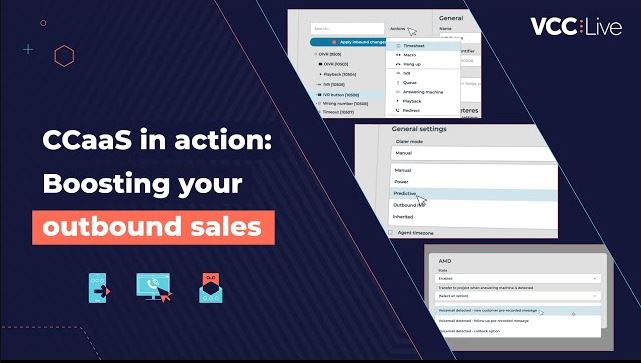The internet has revolutionized how businesses communicate with their customers like nothing before. Times have definitely changed, and so have available call center technologies. Not so long ago call centers had no choice but to rely on physical telephone lines, but now they can contact customers via the internet using VoIP technology.
Indeed, the evolution of the Internet has completely changed our world, giving businesses the opportunity to now use multiple platforms to connect with their customers anytime, anywhere.
And since VoIP technology is cloud-compatible, call centers only need an internet connection in order to leverage it.
For voice communication via VoIP technology, however, bandwidth requirements are essential, since voice data is a type of data that is much bulkier than conventional text.
In this article, I’ll tell you about how much bandwidth a VoIP call requires. Read on and make sure bandwidth issues are not stopping your call center from sending and receiving high-quality calls!
VoIP technology and bandwidth – what you need to know
Communication has always been the core activity for any call center. As already mentioned, although call centers relied for a long time on PSTN, or Public Switched Telephone Network when setting up their telephone lines, today they use VoIP (Voice over Internet Protocol, also known as internet telephony) technology to leverage their internet connection.
VoIP was created to allow businesses to switch from the comparatively expensive PSTN solution when sending and receiving voice calls and multimedia communications over the internet. With the fast evolution of technology, today VoIP technology can be used with voice, video, and text, as well as other types of data.
VoIP technology makes it easier for call centers to set up and expand their operations, so it’s no surprise that more and more companies are transferring their network operations from PSTN to VoIP. Furthermore, as VoIP calls are cloud-compatible, the new technology allows call centers to utilize home-based agents.
Finding the right system for your call center is no easy task. So, if you still have doubts, make sure to check out our article comparing call center technologies.
However, when it comes to transferring network operations to VoIP, the amount of bandwidth businesses need in order to send and receive high-quality calls has very specific requirements.
Before we immerse ourselves in the topic, let’s quickly define what bandwidth is. Bandwidth is the ability to transfer data (such as a VoIP telephone call) from one point to another in a fixed amount of time. The higher bandwidth speed you have, the more data you can transfer.
Bandwidth is measured by checking your download and upload speeds, in other words the rate of information traveling to and from your computer. Whichever of the two numbers is lower is considered your bandwidth.
Bandwidth requirements for VoIP calls
The amount of bandwidth (upload and download capacity) your call center needs per agent for your VoIP calls greatly varies depending on the call center software you’re using.
For example, if you use VCC Live’s system we recommend on average 100kbps per call placed by agents, both for download and upload speeds. The exact number, however, varies by the codec (coder/decoder) used, but 100kbps is a good rule of thumb.
What is codec? Codec is used to encode audio from an analog signal to a digital signal, so that it can be passed across a data network Bandwidth handles this conversion and enables communications to be carried across applications almost seamlessly.
There’s no doubt that it’s best to turn to your solution provider for advice on your bandwidth requirements. There are a few general rules, however, that you should definitely take into consideration before switching to VoIP technology:
1. VoIP is full duplex, meaning that it can both receive and send data at the same time. But while the average internet user requires high download speeds for streaming and downloading music and videos, for VoIP you’ll also need to be able to send data at a high rate, so you’ll need to consider the upload speed as your benchmark. Generally speaking, the higher your upload speed, the more reliably consistent the quality of your VoIP phone calls will be.
2. Upload speeds are usually slower than your download speeds, so don’t commit the mistake of calculating bandwidth based on the higher number (which will be your download speed). With reference to the amount of bandwidth for VCC Live®’s system mentioned above, this means that if your download speed is 10Mbps, but your upload speed is only 1Mbps, then your bandwidth will only cover 10 calls and not 100 calls.
3. Bear in mind that for VoIP calls a broadband connection is required. In fact, only a broadband internet connection can provide the minimum bandwidth for quality VoIP calls.
4. Over the last years we’ve become so used to having constant internet connection that it’s easy to fall into the mistake of assuming that a call center has the same requirements as for general internet use. The truth is that, due to the mass telephony and communication activities taking place at call centers, call center internet traffic requirements are considerably more demanding than general office Internet use.
5. In addition, these days most call centers leverage multichannel communication by providing customer service using a number of channels. And don’t forget that other applications, such as Facebook, Twitter or Gmail, use bandwidth as well. Therefore, you’ll need to assess the popularity and peak times of all your channels, as there may be periods of low-quality calls if all of your channels are burdened at the same time. Finally, don’t forget that while emails use very little bandwidth, attachments increase that bandwidth considerably.
6. Always make sure to rely on QoS or “Quality of Service”, which can reserve a proportion of your bandwidth and ensure that you’ll always have enough upload and download capacity to send and receive high-quality calls. While customers are willing to wait for an email to load, they are less tolerant regarding low-quality calls.
7. As we all know, an unexpected power outage can present a nightmare scenario for any business that does not have a backup solution in place. Therefore, consider installing two connections, which can operate in parallel but are also able to work independently in the event of a disaster.
Do the math and see for yourself!
If you’re considering switching to VoIP technology, it’s essential to use a bandwidth speed test to determine if and how many phone lines your connection can handle in order to sustain high-quality voice calls.
Generally speaking, the amount of bandwidth that is needed for VoIP calls depends on how many concurrent calls you’ll be making.
My advice is to always run your VoIP on a high-quality internet connection with at least 100 Kbps upload bandwidth available for each call in progress at the same time.
Using the table below, you can get an overall idea about how much bandwidth you’ll need for your calls.
| Number of concurrent calls |
Recommended minimum bandwidth |
| 1 |
100 Kbps |
| 5 |
500 Kbps |
| 10 |
1000 Kbps (1 Mbps) |
| 20 |
2000 Kbps (2 Mbps) |
Bandwidth needs testing
As VoIP technology solely uses the internet, your call quality depends on the internet service you choose. When switching to VoIP technology, always make sure to run bandwidth speed tests and do not forget about the above-mentioned factors that may influence your bandwidth requirements.



















